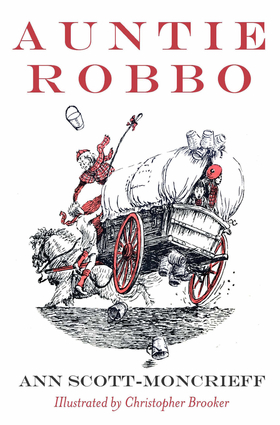Reviews
I first met Auntie Robbo on a sunny day six years ago, in Any Amount of Books second-hand book-shop in Charing Cross Road. She was not exactly looking at her best at that point: originally released in 1941, this Puffin edition from 1962 crudely transposed an illustration by Christopher Brooker on its cover. You had to peer at it to realise it showed a horse-drawn caravan jolting along at a dangerous pace, while an elderly woman – rakishly attired – hauled a young boy aboard with calm insouciance.But once I’d seen that, I knew I had to jump aboard that caravan as well.I fell head-over-heels in love with Auntie Robbo and passed old Puffin editions onto friends. I could never quite understand: why wasn’t it better known? Why hadn’t it become one of those Puffins everyone reads to death and hangs onto through life? Why had there never been a movie adaptation, by Ealing or the Archers or Disney?Why, for goodness sake, was it not still in print – destined to endure only in the shelves of Impossible Libraries like mine… I’m surely not alone in loving novels that feature wild, wise and wonderful old women (often grandmother figures). Novels like Lucy Boston’s The Children of Green Knowe, Roald Dahl’s The Witches, and now The House with Chicken Legs (and you’ll tell me the ones I’ve forgotten, of course). Like Tolly Oldknow, Auntie Robbo also features an admiring grandson, and that’s a wonderful relationship to see celebrated in fiction: the rebellious old women doing all the talking, the fey young men shutting up and listening for once.In Auntie Robbo, it’s eleven year old Hector sitting beside eighty year old Aunt Robbo (short for Robina, which to me suggests Robina Crusoe’s adventures in the Girl’s Own Paper), as she drinks her coffee and he eats his bread and jam. She is not his Auntie, or his Grandmother, but his Great-Grand Aunt. In their remote old house, Nethermuir, she tells him of the travels of her youth, and sometimes they go to old battlefields to improve Hector’s grasp on history. “[We] ride over the battlefields and go and look at the castles where the murders were done.” Seeing Merlissa Benck’s shocked expression, Hector explained seriously. ‘Scottish history has a great many murders, you know.’‘I dare say,’ said Merlissa Benck shortly. ‘But I should have thought British history would have been more suitable for a boy of your age, indispensable in my opinion. England’s story is a very great and noble one.’‘Yes,’ said Hector. ‘But then we couldn’t ride to the battlefields, could we? I mean they were mostly fighting in places that didn’t belong to them, weren’t they?’ Hector has no wish to jostle about with boys his own age, and certainly no intention of going to school. When a couple of self-interested do-gooders (hell Merlissa Benck) try and rescue the boy from this outrageously dysfunctional upbringing, he and Auntie Robbo take off by bus at dead of night, and begin a string of wild adventures.So you may be able to tell, already, that this is a truly wonderful book. So why is it not better known? I couldn’t help wondering – was it possibly the fact it was Scottish? Parochial book publishers, thinking the English kids wouldn’t ‘get’ it? Well, it turns out that’s precisely what happened: ‘too Scottish’ for the UK, and so it was first published in the US, albeit with a warning: it had not “a shadow or suspicion of a moral”.Well, that may be true – but it certainly has an urgent sort of message to it, although thankfully without a trace of saccharine about it. It argues against convention and for freedom, against respectability and for bohemianism, against stale compromise and for the wide open beauty of the Highland countryside. There are lyrical descriptions of the coast and the woods, and even that night bus racing through the darkness. Hector and his Auntie end up racketing about with three other orphans, getting in and out of trouble, but they all end up living life according to their own characters. Image from the NaAuthor Biography
ANN SCOTT MONCRIEFF was born in Orkney in 1914 and died in Nairn in 1943. During her short life she was a journalist, writer and a poet who was immortalized by Edwin Muir in his poem ‘To Ann’. This is the authorised republication with an introduction by Ann Scott Moncrieff's daughter for school-age children. 

